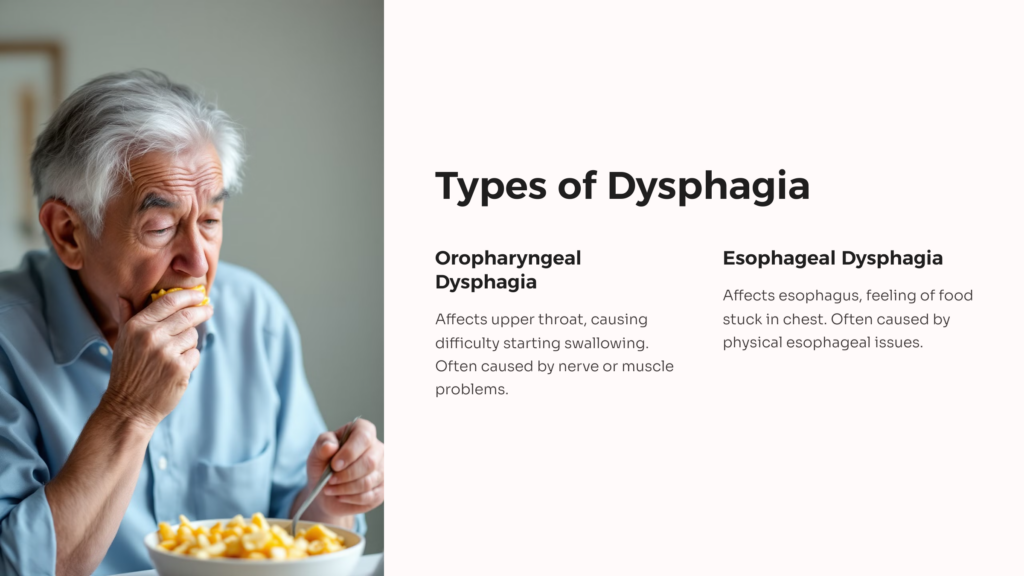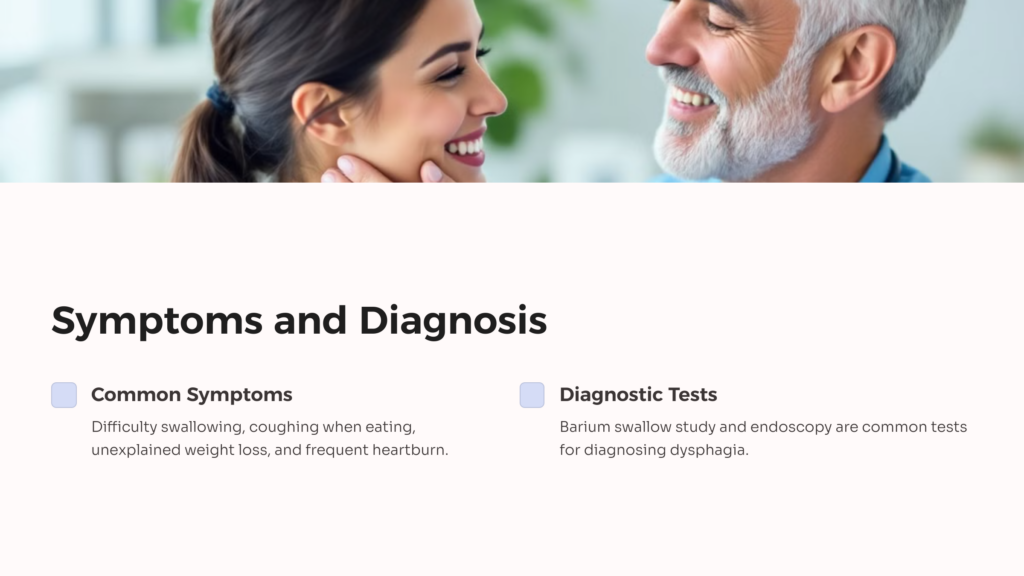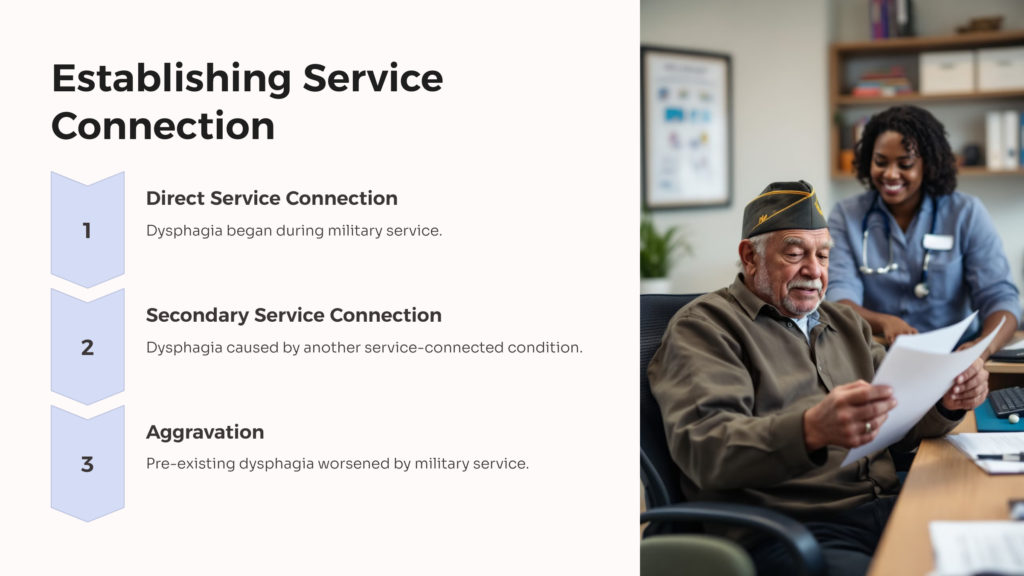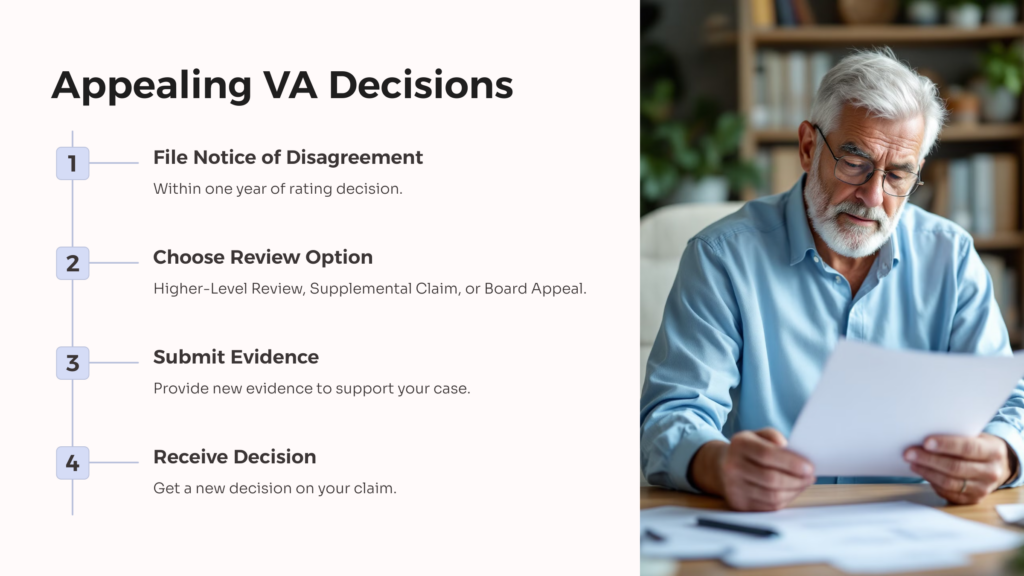Dysphagia is a medical term that refers to difficulty swallowing. It’s a condition that can affect veterans and civilians alike, but for veterans seeking VA benefits, understanding dysphagia is especially crucial. Imagine trying to enjoy a meal with friends or family but struggling to swallow each bite. That’s the reality for many people living with dysphagia.
This condition can range from mild discomfort to severe pain when swallowing. Some people with dysphagia might feel like food is stuck in their throat or chest. Others might cough or choke when trying to eat or drink. In some cases, dysphagia can be so severe that it prevents a person from eating certain foods or even drinking liquids.
Dysphagia isn’t just uncomfortable – it can be dangerous. People with this condition are at risk for malnutrition, dehydration, and aspiration pneumonia (when food or liquid enters the lungs). For veterans, dysphagia can significantly impact their quality of life and ability to work, which is why the VA takes this condition seriously when considering disability ratings.
Types of Dysphagia: Oropharyngeal vs Esophageal

There are two main types of dysphagia: oropharyngeal and esophageal. Understanding the difference is important for both diagnosis and treatment.
Oropharyngeal dysphagia affects the upper part of the throat, causing difficulty starting the swallowing process. People with this condition might cough, choke, or feel like food is going down the wrong way when they try to swallow. This type of dysphagia is often caused by nerve or muscle problems.
Esophageal dysphagia on the other hand affects, as its name might suggest, the esophagus. People with esophageal dysphagia might feel like food is stuck in their chest or throat after they swallow, often caused by physical problems with the esophagus such as an esophageal stricture, also known as narrowing of the esophagus, or scarring. Scarring can be caused by a condition called Gastroesophageal reflux disease (GERD), which is a more serious version of acid reflux, and the chronic backflow of stomach acid into the esophagus can permanently damage and scar it.
A dysphagia VA rating can vary depending on the type. For veterans seeking a VA rating to receive disability benefits to help them manage their symptoms, other factors may include their diagnosis, treatment, and any current disability rating. Working closely with healthcare providers to get an accurate diagnosis and proper documentation for a VA disability claim is essential.
Symptoms and Diagnosis of Dysphagia

Recognizing the symptoms of dysphagia is the first step in getting a diagnosis and proper treatment. Common symptoms to watch out for include:
- Difficulty starting to swallow
- Feeling like food is stuck in your throat or chest
- Coughing or choking when eating or drinking
- Unexplained weight loss
- Frequent heartburn
- Regurgitation (food coming back up)
If you’re experiencing these symptoms, it’s important to see a doctor. They may refer you to a specialist for further testing. Diagnosis often involves a combination of physical exams and special tests. The special tests may include a barium swallow study or an endoscopy. In a barium swallow test, you swallow a liquid containing barium, which shows up on X-rays. This allows doctors to see how you swallow and if there are any problems in your throat or esophagus. An endoscopy is when a small camera is used to look at the inside of your throat and esophagus.
For veterans, getting a proper diagnosis is crucial for your VA claim. Make sure to keep all your medical records and test results. These will be important when you apply for your disability benefits.
Impact of Dysphagia on Veterans
Dysphagia can have a significant impact on a veteran’s daily life. Eating and drinking are basic activities that many of us take for granted, but for veterans with dysphagia, these simple tasks can become challenging and even dangerous.
Many veterans with dysphagia report feeling anxious or embarrassed about eating in public. They might avoid social situations that involve food, leading to isolation. Some veterans might lose weight because eating becomes difficult or unpleasant. In severe cases, dysphagia can lead to malnutrition or dehydration.
Dysphagia impacts all aspects of a veteran’s life even beyond physical health. It can affect a veteran’s ability to work, especially in jobs that require talking or eating with others or if they are unable to get the energy they need because eating is so difficult. This can lead to financial stress and further impact mental health.
Reading personal accounts from veterans who have shared how living with dysphagia has impacted their lives can help show just how far-reaching the effects are. For example, it can completely alter the social life of veterans due to the fear of choking or coughing when going out to eat with friends. The impact of losing support from friends can continue to negatively affect a veteran’s life. These stories highlight the real-life impact of dysphagia on veterans and underscore the importance of proper VA support for this condition.
Establishing Service Connection for Dysphagia

For veterans seeking VA benefits for dysphagia, establishing a service connection is crucial. This means proving that your dysphagia is related to your military service. There are several ways to do this:
- Direct Service Connection: If your dysphagia began during your military service, you might be eligible for direct service connection. You’ll need to show medical evidence of your diagnosis and proof that it started while you were in service.
- Secondary Service Connection: If your dysphagia is caused by another service-connected condition, you might be eligible for secondary service connection. For example, if you have a service-connected neck injury that led to dysphagia, you could claim secondary service connection.
- Aggravation: If you had dysphagia before joining the military, but your service made it worse, you might be eligible for service connection based on aggravation.
To establish a service connection, you’ll need strong medical evidence. This includes your service medical records, current medical records, and often a medical opinion linking your dysphagia to your military service.
Remember, the key is to provide as much detailed, relevant information as possible in your claim. Don’t hesitate to seek help from a Veterans Service Organization or a VA-accredited claims agent if you need assistance with your claim.
VA Rating Criteria for Dysphagia
The VA rates dysphagia under the Schedule of Ratings for the Digestive System, specifically under Diagnostic Code 7203 for stricture of the esophagus. The ratings are based on the severity of the condition and its impact on your ability to eat and maintain nutrition.
Here’s a breakdown of the current rating criteria:
- 80% Disability Rating: Permitting passage of liquids only, with marked impairment of general health
- 50% Disability Rating: Permitting passage of liquids only
- 30% Disability Rating: Moderate
- 0% Disability Rating: Mild, or when the condition causes no impairment of general health
It’s important to note that these ratings can change. The Federal Register provides the most up-to-date official source for VA disability rating criteria.
When evaluating your dysphagia, the VA will consider factors such as:
- Your ability to swallow different types of food and liquids
- The frequency and severity of your symptoms
- The impact on your overall health and nutrition
- Any treatments you’re receiving and their effectiveness
Remember, the VA’s goal is to rate your disability based on how it affects your ability to function in daily life and work. Be sure to provide detailed information about how your dysphagia impacts your daily activities and job performance to get the disability compensation you need to manage this condition.
How to Appeal a VA Rating Decision

If you disagree with the VA’s rating decision for your dysphagia, you have the right to appeal. The appeals process can be complex, but understanding your options can help you navigate it more effectively.
Here are the main steps in the appeals process:
- File a Notice of Disagreement (NOD): This must be done within one year of receiving your rating decision.
- Choose a Review Option: You can choose between a Higher-Level Review, a Supplemental Claim, or a Board Appeal.
- Submit Additional Evidence: If you choose a Supplemental Claim or Board Appeal, you can submit new evidence to support your case.
- Attend a Hearing: If you choose a Board Appeal, you may have the option to attend a hearing with a Veterans Law Judge.
- Receive a Decision: After review, you’ll receive a new decision on your claim.
It’s crucial to meet all deadlines and provide as much relevant evidence as possible. Many veterans find it helpful to work with a Veterans Service Organization or a VA-accredited attorney during the appeals process. Don’t give up if you get a low rating at first. By appealing, you can show how much your dysphagia affects your daily life and make a big difference in your final rating.
Common Challenges in Securing a Dysphagia VA Rating
Securing a fair VA rating for dysphagia can come with several challenges. Being aware of these can help you prepare a stronger claim or appeal.
One common challenge is providing enough medical evidence. Dysphagia can be difficult to diagnose and document, especially if it’s intermittent. Keep detailed records of your symptoms, including how often they occur and how they impact your daily life. Consider keeping a food diary to track what you can and can’t eat.
Another challenge is connecting your dysphagia to your military service, especially if symptoms didn’t appear until after you left the service. This is where a strong nexus letter from a medical professional can be crucial. A nexus letter explains how your dysphagia is likely related to your military service.
Some veterans also struggle with the VA’s rating criteria. Dysphagia can significantly impact quality of life even if it doesn’t meet the criteria for a higher rating. In these cases, it’s important to clearly explain how your dysphagia affects your daily activities and ability to work.
Lastly, the appeals process can be long and frustrating. Stay patient and persistent. Remember, you have the right to appeal if you believe your rating doesn’t accurately reflect the severity of your condition.
Resources for Veterans with Dysphagia
If you’re a veteran dealing with dysphagia, you’re not alone. There are many resources available to help you manage your condition and navigate the VA benefits system.
The VA offers specialized care for veterans with swallowing disorders. Many VA medical centers have speech-language pathologists who can help diagnose and treat dysphagia. They can also provide strategies to make eating and drinking safer and more comfortable.
Support groups can be invaluable for veterans with dysphagia. The National Foundation of Swallowing Disorders offers online support groups where you can connect with others facing similar challenges.
For help with your VA claim, consider reaching out to a Veterans Service Organization (VSO) like the Disabled American Veterans (DAV) or the American Legion. These organizations offer free assistance with VA claims and appeals.
Online resources can also be helpful. The VA’s website has a wealth of information about benefits and health care. Our site AllVeteran.com is also filled with guides and tips for navigating the VA system. Browse through our library of veteran resources to find the answers you need, or contact us for expert guidance and assistance regarding your health care options. Take the quiz on our homepage for a free medical evidence screening today.
Remember, your healthcare team is a crucial resource. Don’t hesitate to ask questions and seek help managing your dysphagia. Your doctor or speech-language pathologist can provide personalized advice and treatment options.
Expert Tips for Maximizing Your VA Benefits
When it comes to securing the best possible VA rating for your dysphagia, knowledge is power. Here are some expert tips to help you maximize your VA benefits:
- Document Everything: Keep detailed records of your symptoms, treatments, and how dysphagia affects your daily life. This includes doctor’s visits, prescribed medications, and any special diets or eating techniques you need to use.
- Get a Comprehensive Medical Evaluation: Seek a thorough evaluation from a specialist, preferably one familiar with VA claims. They can provide detailed documentation of your condition and its severity.
- Understand the Rating Criteria: Familiarize yourself with the VA’s rating criteria for dysphagia. This can help you and your doctor provide the most relevant information in your claim.
- Consider Secondary Conditions: If your dysphagia has led to other health issues, like weight loss or malnutrition, make sure to include these in your claim.
- Be Specific About Functional Impacts: Clearly explain how your dysphagia affects your ability to work and perform daily activities. Use specific examples.
- Stay Up-to-Date: VA regulations can change. Keep informed about any updates to the rating schedule that might affect your claim.
- Don’t Go It Alone: Consider working with a VSO, accredited attorney, or claims agent who specializes in VA disability claims.
Remember, the goal is to paint a clear, accurate picture of how dysphagia affects your life. Don’t downplay your symptoms. Be honest about how difficult things are. It’s not about complaining – it’s about making sure the VA understands your situation.
By following these tips and staying persistent, you can improve your chances of receiving a fair VA rating for your dysphagia. Remember, you’ve served your country – now it’s time to make sure you get the support you deserve. Begin the journey now by taking our free eligibility quiz at AllVeteran.com.
 AllVeteran.com Advisors
AllVeteran.com Advisors
With expertise spanning local, state, and federal benefit programs, our team is dedicated to guiding individuals towards the perfect program tailored to their unique circumstances.











